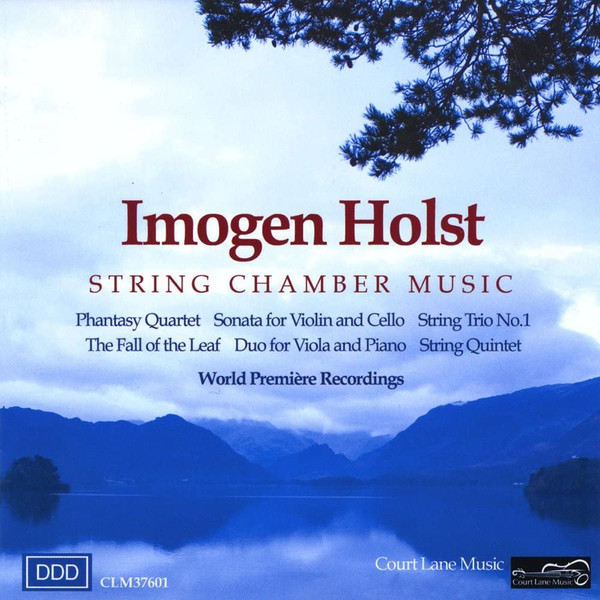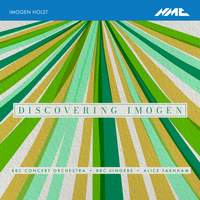Imogen Clare Holst was an English composer, arranger, conductor, teacher, musicologist, and festival organiser and administrator. The only child of the composer Gustav Holst she is better known for her educational work at Dartington Hall in the 1940s, and for her 20 years as joint artistic director of the Aldeburgh Festival than her compositions. In addition to composing music, she wrote composer biographies, music educational material, and several books on the life and works of her father. The Holst family was originally of Latvian descent (her great grandfather was from from Riga) and a very musical family it was. From a young age, Imogen showed exceptional talent in composing and performance. She attended Eothen School and St Paul's Girls' School then joined the Royal College of Music, where she developed her skills as a conductor and won several prizes for composition. Originally she dreamed of being a pianist or a dancer but for health reasons these never came to fruition and she spent most of the 1930s teaching and organising events for the English Folk Dance and Song Society. After serving as an organiser for the Council for the Encouragement of Music and the Arts, at the start of the Second World War, in 1942 she began working at Dartington and for the next decade she was chiefly responsible for establishing Dartington as a major centre of music education and activity.
In the early 1950s Holst became Benjamin Britten's musical assistant, moved to Aldeburgh, and began organising the annual Aldeburgh Festival. By 1956 she was joint artistic director of Aldeburgh and during the following 20 years made it a major part of the musical landscape. In 1964 she gave up her position as Britten's assistant to restart her neglected composing career and to work on the preservation of her father's music. Her own music is actually largely unknown, unpublished and unperformed and the first recordings dedicated to her music were issued in 2009 and 2012. All of these works were well received by critics. In 1975 she was awarded a CBE and received a host of academic honours. She died in 1984, at Aldeburgh, and is buried in the churchyard there.
Imogen Holst wrote two string quartets, a string quintet and several other chamber works and the work in review, today, is the Phantasy Quartet, a short single-movement work composed in 1928 but not premiered until 2007. Holst won the 1928 Cobbett Prize for this work (Btw, this work should not be confused with Gustav Holst's Phantasy Quartet on British Folksongs for String Quartet op.36).
The Quartet starts out in pastoral fashion with an emphasis on harmonics. The work is based on two themes, which are transormed throughout the piece. So what we get is lovely harmonic language, which is common amongst Imogen's works and whilst her music is unlike her father's she has the same back for creating rich atmospheres. There's no particular melody here just handsome harmonic development but a change (the 2nd theme) is ushered in by violins together, breaking the calm mood yet soon the mood turns pastoral. However this is not merely "cowpat music" (as my fellow TC member, Kreisler, would say). The violins swirl and float across a fairly barren musical landscape but just as you are feeling comfortable again some bold chords break the air and the music accelerates and gets busier until quieter, more sombre music returns led by a lone violin. Again you don't get the chance to settle as things get more intense and the cello starts to set the pace. The bold chords are back and bring with them the lone violin. Harmonies lead to quieter, relaxed music. Eventually there's drones, passionate climatic music all rounded off with a gentle ending.
When I first wrote this blog review there was just one recording of this piece. Fast forward a few months and we now have 3!
Malion Quartett - this promising German ensemble have won multiple SQ awards and you can hear why. Theirs is the quickest recording here but it's certainly not rushed. Offering a well blended sound the German quartet are in great form. The sound quality on this recording is lovely as is the whole of the Malion's cohesive realisation.
Hewitt Jones et al - self-proclaimed "Box-scraper" (violinist) Simon Hewitt Jones and his friends set about recreating Holst's beautifully harmonic landscapes with great gusto. This was the premiere recording and it gathered positive reviews upon release because it's a high quality recording. The sound is clear and highly detailed and Hewitt Jones and pals really nail those lovely harmonic sections. Hewitt Jones' sublime violin playing, and the ensemble's firm playing throughout, is a joy.
GoYa Quartet - the newest recording here, this 2024 Gutman release (from their 'Autumn Leaves' set) is a beautiful effort from the Amsterdam-based foursome. Although the broadest account there's certainly no sluggishness in this bold performance. The Dutch quartet are alive to Holst's imaginative score and favour strong phrasing and punchier dynamics over a more blended sound. A high quality release.

Merl's Blogged String Quartet and String Quintet...
As some of you are aware I started blogging my recommended string quartet recordings a while back as I didn't want to lose them in the Weekly String Quartet thread. However, blogging on TC has many limitations and there was no way to link all my posts in one place without the page disappearing...






